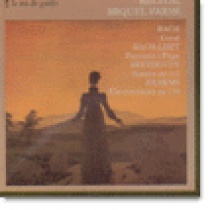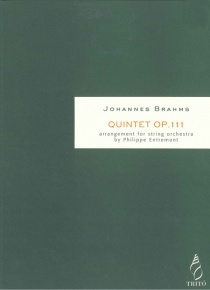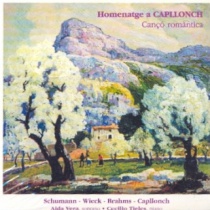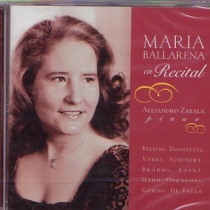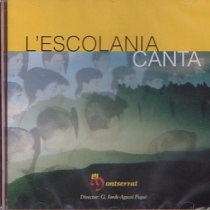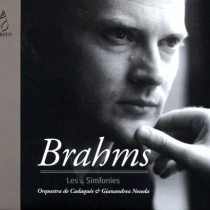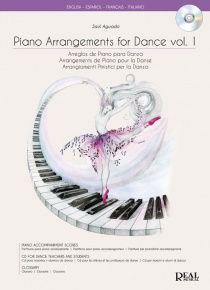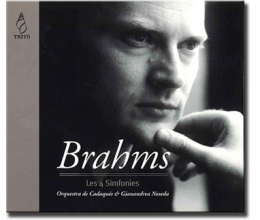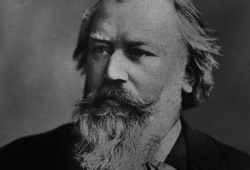
Brahms was born in Hamburg. He showed early promise on the piano and helped to supplement the rather meager family income by playing the piano in restaurants and theaters, as well as by teaching. In his early teens he began to conduct choirs and eventually became an efficient orchestral conductor.
He began to compose quite early in life, but his efforts did not receive much attention until he went on a concert tour as accompanist to the Hungarian violinist Eduard Reményi in 1853. On this tour he met Joseph Joachim at Hannover, and went on to the Court of Weimar where he met Franz Liszt, Cornelius and Raff. Joachim had given Brahms a letter of introduction to Robert Schumann, and Brahms walked to Düsseldorf, being welcomed into the Schumann family. Schumann, amazed by the 20-year-old’s talent, published an article ’Neue Bahnen’ (New Paths) in the journal Neue Zeitschrift fur Musik alerting the public to the young man whom he claimed was ’destined to give ideal expression to the times’. He became very attached to Schumann’s wife, the composer and pianist Clara. After Schumann’s attempted suicide and subsequent encarceration in a mental sanatorium in 1854, Brahms was the main go-between between Clara and her husband, and found himself virtually head of the household.
After Schumann’s death in 1856 Brahms divided his time between Hamburg and Vienna. Since 1864 he based himself increasingly in Vienna and soon made his home there. He had been composing steadily throughout the 1850s and 60s, but his music had evoked divided critical responses. His works were labelled old-fashioned by the ’New German School’ whose principal figures included Liszt and Wagner. Brahms in fact admired some of Wagner’s music and admired Liszt as a great pianist, but in 1860 he attempted to organize a public protest against some of the wilder excesses of their music. Brahms fell ill of cancer and his condition gradually worsened; he died on April 3, 1897. He is buried in the Zentralfriedhof in Vienna.
Although Brahms may be often regarded as one of the last bastions of the Romantic Period, he was a champion of form and logic within his works in contrast to the opulence and excesses of many of his contemporaries. Though he was diametrically opposed to Wagner during his lifetime, it is incorrect to characterize Brahms as a reactionary. His output was sometimes equally bold in harmony and expression, prompting Arnold Schoenberg to write his important essay entitled "Brahms the Progressive" which paved the way for the revaluation of Brahms’s reputation in the 20th century.
He began to compose quite early in life, but his efforts did not receive much attention until he went on a concert tour as accompanist to the Hungarian violinist Eduard Reményi in 1853. On this tour he met Joseph Joachim at Hannover, and went on to the Court of Weimar where he met Franz Liszt, Cornelius and Raff. Joachim had given Brahms a letter of introduction to Robert Schumann, and Brahms walked to Düsseldorf, being welcomed into the Schumann family. Schumann, amazed by the 20-year-old’s talent, published an article ’Neue Bahnen’ (New Paths) in the journal Neue Zeitschrift fur Musik alerting the public to the young man whom he claimed was ’destined to give ideal expression to the times’. He became very attached to Schumann’s wife, the composer and pianist Clara. After Schumann’s attempted suicide and subsequent encarceration in a mental sanatorium in 1854, Brahms was the main go-between between Clara and her husband, and found himself virtually head of the household.
After Schumann’s death in 1856 Brahms divided his time between Hamburg and Vienna. Since 1864 he based himself increasingly in Vienna and soon made his home there. He had been composing steadily throughout the 1850s and 60s, but his music had evoked divided critical responses. His works were labelled old-fashioned by the ’New German School’ whose principal figures included Liszt and Wagner. Brahms in fact admired some of Wagner’s music and admired Liszt as a great pianist, but in 1860 he attempted to organize a public protest against some of the wilder excesses of their music. Brahms fell ill of cancer and his condition gradually worsened; he died on April 3, 1897. He is buried in the Zentralfriedhof in Vienna.
Although Brahms may be often regarded as one of the last bastions of the Romantic Period, he was a champion of form and logic within his works in contrast to the opulence and excesses of many of his contemporaries. Though he was diametrically opposed to Wagner during his lifetime, it is incorrect to characterize Brahms as a reactionary. His output was sometimes equally bold in harmony and expression, prompting Arnold Schoenberg to write his important essay entitled "Brahms the Progressive" which paved the way for the revaluation of Brahms’s reputation in the 20th century.
Publications (15)
Johannes BrahmsAll the products
Johannes Brahms
Latest concerts
Johannes Brahms 03July
2015
2015
12April
2015
2015
ohann S. Bach:
Konzert für Cembalo und Orchester, d- moll
Suite in h-Moll für Flöte und Orchester
Ludwig van Beethoven: Violinromanzen, F-Dur und G-Dur
Johannes Brahms: Quintett in G ob,111 (Fassung für Kammerorchester)
25November
2012
2012
National Gallery of Art Orchestra, dir. Philippe Entremont
14July
2012
2012
27May
2011
2011
Orchestra Santa Maria Lucerne, dir. Droujelub Yanaklev
Works
Johannes BrahmsFor Orchestra
| Title | |
|---|---|
| Quintet op. 111 | String Orchestra |
Latest News
Johannes Brahms
The Cadaqués Orchestra conducted by Gianandrea Noseda presents the complete symphonies of Johannes Brahms in a double CD.
This symphonic cycle, despite being one of the least extensive, is one of the keys to understanding the transition from ...
Read more



